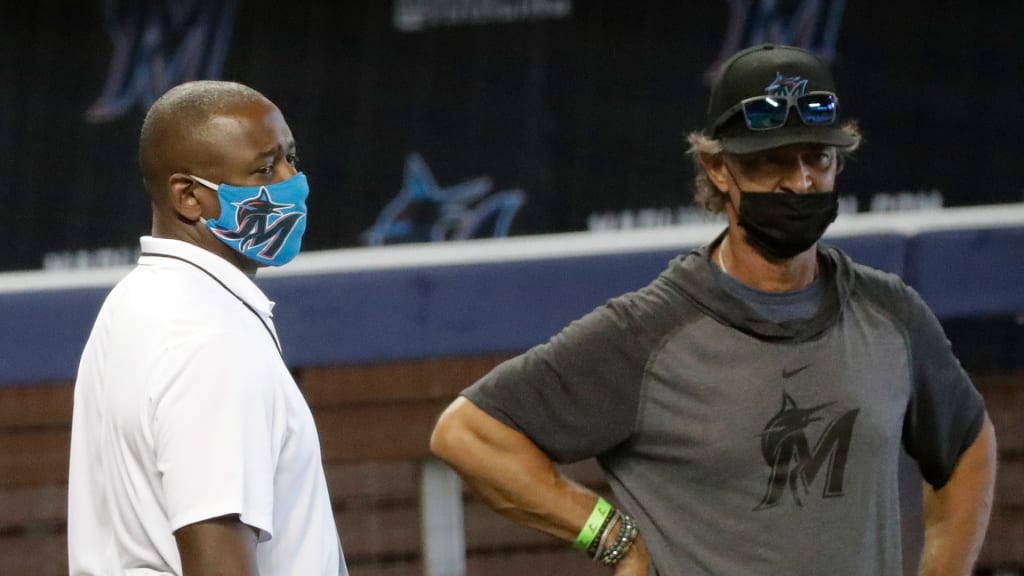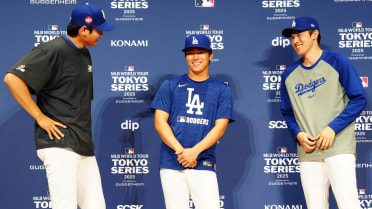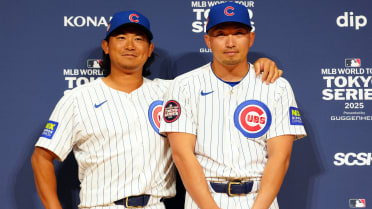Hill talks Marlins' outlook, COVID and more

Last year, the Marlins had the worst record in the National League, losing 105 games. Fast forward to February. Michael Hill, the Marlins' president of baseball operations, told MLB.com that Miami would be competitive in 2020, and he was right. The Marlins are now in the playoffs and will face the Cubs in the NL Wild Card Series starting 2 p.m. ET Wednesday at Wrigley Field.
MLB.com caught up with Hill a day after the Marlins clinched a playoff spot at Yankee Stadium. He talked about everything from the success on the baseball diamond to temporarily losing 18 players due to COVID-19. Because of the illness, the Marlins used 61 players and made 171 roster moves this season.
MLB.com: I’m talking to you a day after the Marlins clinched a playoff berth. Tell me how you feel right now. Nobody expected the team to play in October after losing 105 games the previous year.
Michael Hill: You talk to anybody in our organization, you talk to our players and there was a belief [we could win]. We reported to Jupiter, Fla., in February, and we felt like we had as much talent as anybody. We felt like our starting pitching could match up with anybody. We felt we added some pieces offensively to go along with the maturation of our young core players. We really felt like this team had a chance to be a special team.
MLB.com: The amazing part is, when I spoke to you in February, you thought the team would improve.
Hill: One hundred percent. Nobody else was in our clubhouse. I don’t think anyone [outside the organization] did a deep dive into the makeup of our roster. They haven’t seen the growth of Sandy Alcantara. They haven’t seen Pablo López. They heard about Sixto Sánchez. To that point, [Sánchez] had thrown 100 career innings and nothing above Double-A. They had heard that Miguel Rojas was a clutch player and Brian Anderson had ability. Until they get to see it all come together, I don’t think anyone believed what we were saying.
MLB.com: After the first week of the season, the Marlins had 18 players test positive for COVID-19. Tell me what the feeling was like to lose so many players to the illness? You had to make so many roster moves.
Hill: We marvel at ourselves -- 171 roster moves to be exact, as of today. It’s hard to imagine anything like it. You talk about a season of so many unprecedented things. That’s one you never encountered. As a front office, you are planning on a player hurting his arm or pulling a hamstring. You are replacing a player every couple of weeks. In a matter of days, it went from one player with the virus to four players to 13 players to 15 players to 18 players. This is in a matter of days. The stressful part of it was trying to get to the end of it. At that point, we were testing daily, just trying to figure out how deep the outbreak was going.
We were in Philly. The tests were being sent to Rutgers. So, we were getting results somewhere between midnight and three in the morning. We are all on quarantine, so we are locked down. So, you are having Zoom meetings. You are having Zoom meetings with your baseball ops department. You are meeting with your players and Major League staff to keep them updated. And then you are dealing with your front office group and your pro scouts, trying to see how we adjust to the news that X has come up positive, Y has come up positive.
When it was all said and done, 18 players. We knew eventually it was going to stop, and we were going to get back on the field. We did what we needed to do to make sure we had a competitive team on the field. It was a combination of reviewing the inventory we had at the alternate training site, then it was the review of the marketplace and clubs we had talked to and what might be available with other clubs, what might be on the waiver wire. It was truly a collective effort to try to withstand what we were going through.
MLB.com: Be honest. Did you think the season was over after so many players contracted the virus?
Hill: I didn’t think the season was over. We had good players. We felt like we could weather the storm with our prospects. I was just afraid we wouldn’t have enough players to play. Thankfully, we were able to get through it. We talk about the group of players from our original 30 that remained healthy. It was 13 players. It was one of those things where it became our rallying cry. No matter what was thrown at us, there was nothing that was going to derail us from our ultimate goal. This is a tough-minded group. This is a group that persevered. Whatever the challenge may be, we faced it head on and then we kept moving.
MLB.com: In retrospect, did the team do anything wrong? Everyone talks about social distancing and wearing a mask. Was the protocol followed?
Hill: I don’t think we did anything wrong. You are trying to play baseball in a pandemic. You can contract this thing by touching something inadvertently. You just don’t know. That’s the crazy thing about it. When the outbreak happened, this disease wasn’t eight months old. As we know, there are things we are still learning about the disease. Once we got through it, it was sort of a case study for everyone. We knew how to deal with it. The league knew how to deal with it. To this point, we have been able to manage it as an industry. I think we are all excited and looking forward to the playoffs and what the next few weeks holds for everyone.
MLB.com: Of the 171 moves you made, which one was the most pleasant surprise?
Hill: They were all rewarding and necessary, but we had 18 of our prospects debut in the big leagues. We don’t endure and overcome what we were able to do without a deep, strong Minor League system. That’s something that might get lost in the wash with everything going on, but if you don’t have those players available, we don’t have a chance. Each one of those guys who made their debut, that’s a special moment because those are guys who were scouted, drafted and developed in our system.
The next thing that comes to mind -- and it was a big turning point for this organization -- was the Trade Deadline. … We feel like our pitching is holding up and is going to keep us in it. We wanted to get a veteran stabilizer to our lineup. Our young outfielders were going through the growing pains. We were able to consummate the deal to acquire Starling Marte. That same day our club rallied to beat [Mets ace] Jacob deGrom. Our guys don’t feel sorry for themselves. They don’t complain. Whatever is thrown at them, they face it head-on and they do their jobs.
MLB.com: How far can you guys go in the playoffs?
Hill: There is a belief when you get to October: Power arms and power pitching can lead you. We have three guys at the front of our rotation who pitch in the upper 90s to 100s [mph]. We’ll take Sandy Alcantara, Sixto Sánchez and Pablo López along with Trevor Rogers. We’ll match them up with anybody. The world may not know those names. Outside the American League and National League East divisions, there are people who may not know who they are. When they step on the mound, they will know who they are because these are special arms. Every time they step on the mound, they give us a chance to win. We are fully confident we will go into this thing and wreak havoc. Hopefully, we are the last team standing when it’s all said and done.
MLB.com: You and I talked about this in February. Your contract is up after the season. Do you expect to be back with the Marlins for years to come?
Hill: That’s probably not the question for me because I don’t control it. I’m taking it day by day. I’m incredibly proud of the job that we have done here as a baseball operations department. I think we set out to do what we have been able to do. We built a tremendous farm system. We have a good Major League team. We got the team to the playoffs after a 17-year drought. We still have an opportunity to [win the World Series]. Whatever happens, I’m proud of what we have been able to accomplish. I’m proud to work with the men and women that I work with on a daily basis. If I’m blessed enough to receive another contract, I will continue to give my blood, sweat and tears to bring championships to South Florida.
MLB.com: I’m going to mention some names and tell me what comes to mind. Let’s start with Don Mattingly.
Hill: The best. I say it often: In this job, you need a partner who shares your vision. I couldn’t ask for a better one than Don Mattingly. His leadership, his steadiness through all of this is a big reason [we are in the playoffs]. It was so much a manager he had to deal with -- 171 transactions. It has been almost three rosters worth of players that we have used. ... That speaks volumes to his leadership and our coaching staff’s leadership -- just to weather what was thrown at us and to keep it moving.
MLB.com: Manager of the Year?
Hill: My Manager of the Year -- every day and twice on Tuesday.
MLB.com: Derek Jeter.
Hill: He sets the tone for all of us. The second he walked through the door, you knew [the culture] was changing. Whatever issues we faced as an organization, with his guidance and leadership, we would overcome it. You talk about Donnie on one end, it a pleasure to have Derek on the other because it means so much to have someone in ownership. He is ownership, but he is also our CEO, who understands what’s going on in that clubhouse and in that dugout. His perspective is huge in helping us.
MLB.com: José Fernández. The only reason I mention him is because the Marlins clinched a playoff spot on the fourth anniversary of his death.
Hill: I say that is the worst day of my professional career. I was the first one to get that call from Miami-Dade Fish and Wildlife. It forever changed this organization. It was an emotional time. In the midst of all the celebration, I had to step away. I just cried like a baby in the dugout. You feel there is a higher power for certain things. For us to overcome what we have been able to overcome, there is obviously something more at work. For us to do what we did and clinching it at Yankee Stadium on the anniversary of his death, it makes you know he is still with us, still watching over us and still a part of the Marlins' organization.
Bill Ladson has been a reporter for MLB.com since 2002. He covered the Nationals/Expos from 2002-2016.




